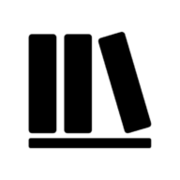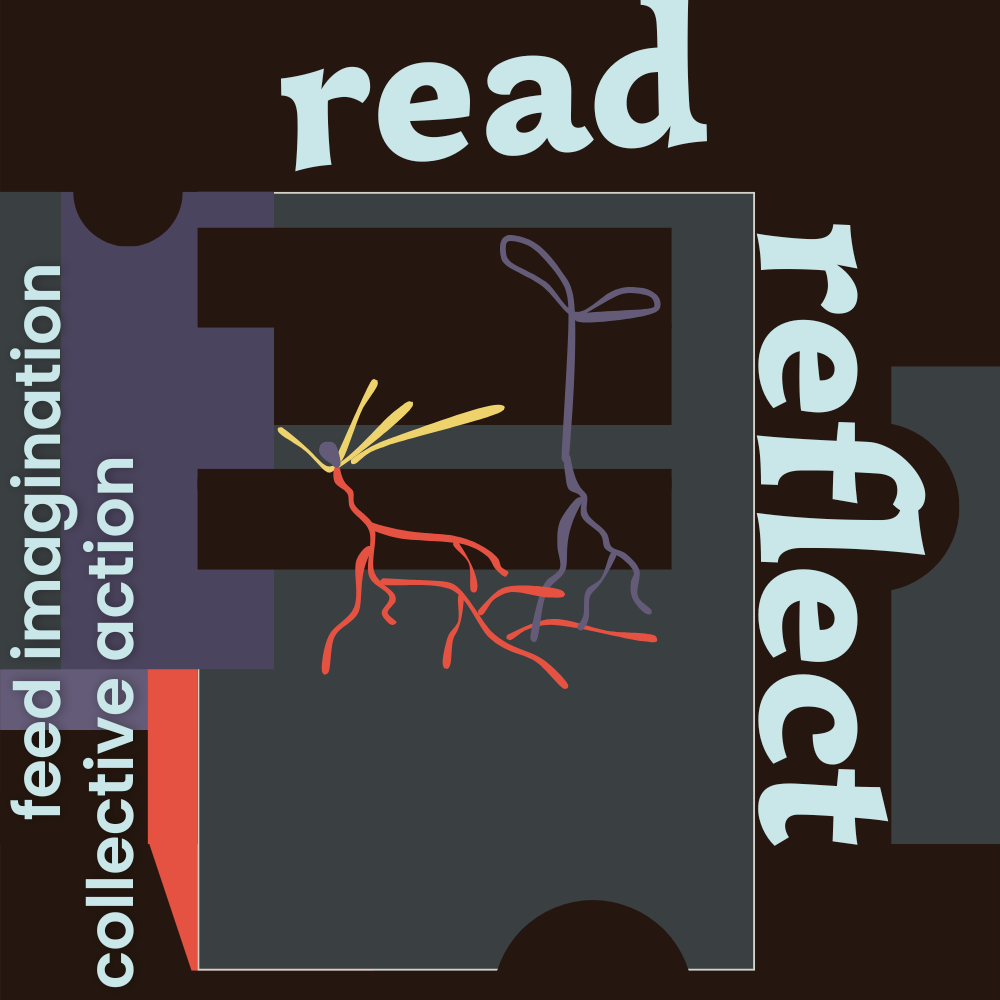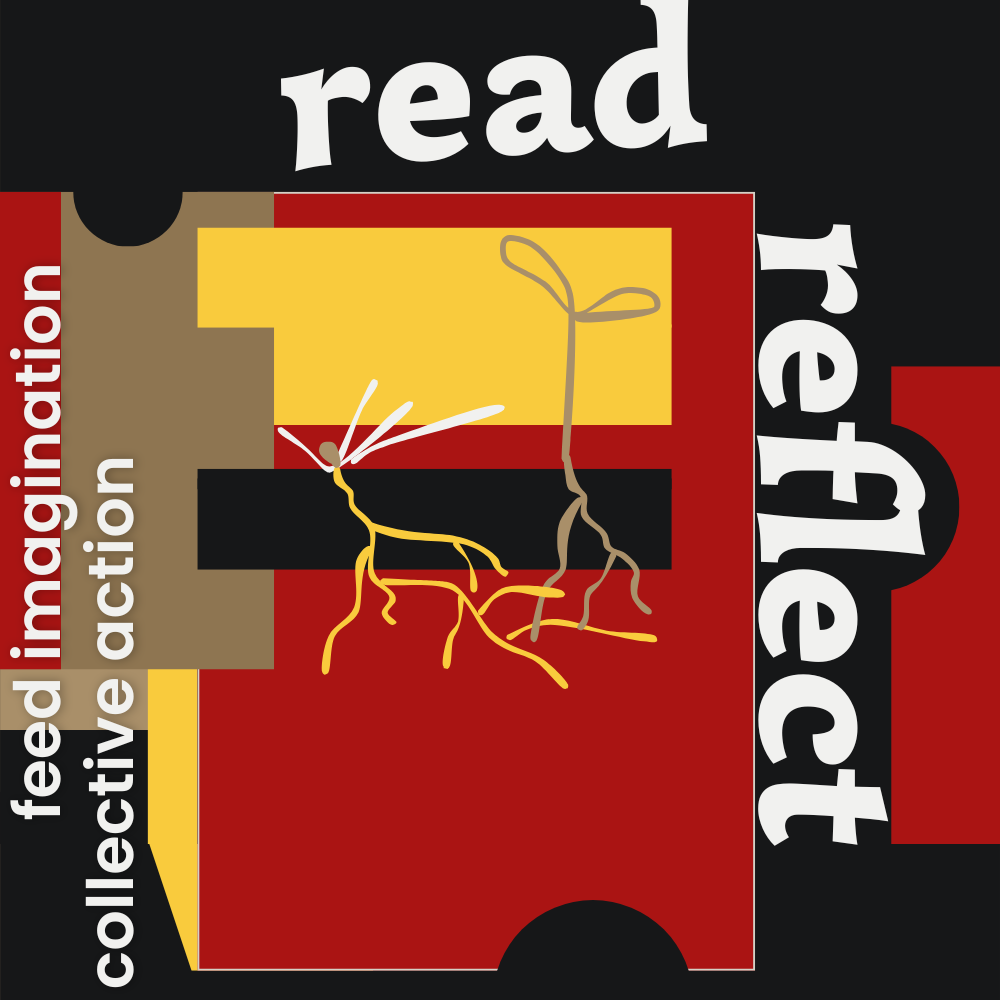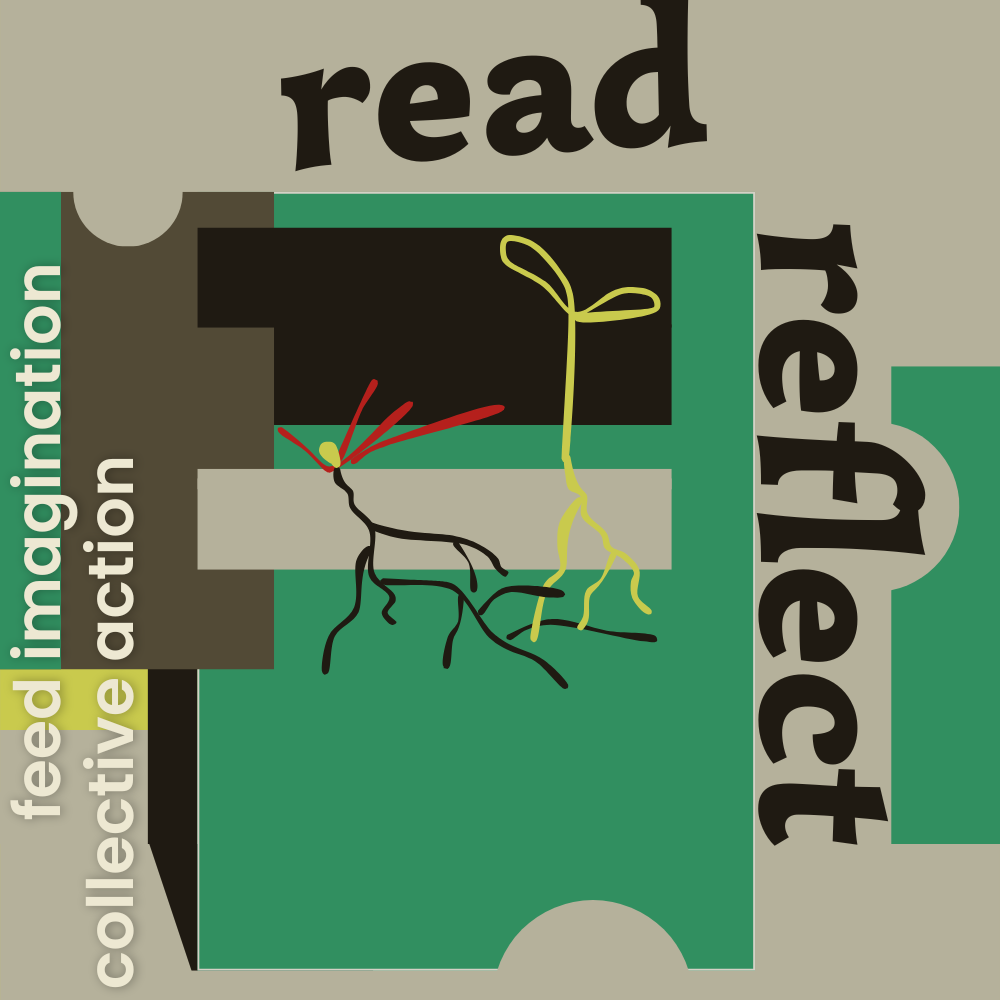Read, Seed, Water, Feed reading challenge: overview
This is an introductory post for Read, Seed, Water, Feed, an intentionally reflective reading challenge born of disability—cognitive, invisible, physical—persistence, care, luck, love for the people of the planet, hosted on Storygraph.
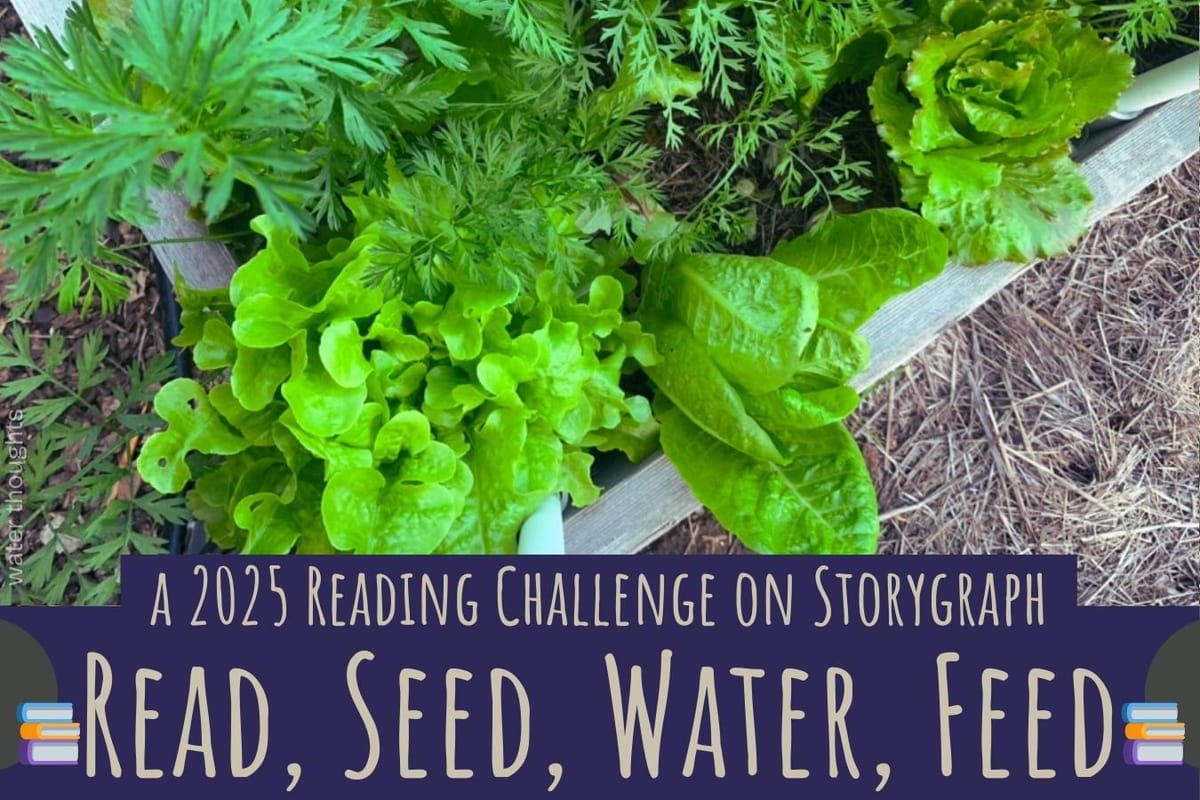
Welcome to the Read, Seed, Water, Feed - 2025 Challenge!
This is an introductory post for Read, Seed, Water, Feed, an intentionally reflective reading challenge born of disability—cognitive, invisible, physical—persistence, care, luck, love for the people of the planet. The prompts were developed partly from my own reading and experiences, on topics very close to my heart, with a focus on authors who are Black, Indigenous, and/or part of the global majority.
This isn't how I originally thought I would share the introduction to the Read, Seed, Water, Feed reading challenge, though I think this is much clearer than my original writing. The reflections I had started writing related to the components of the reading challenge (read, seed, water, feed) will follow in subsequent posts.
what's the soil like here?
This challenge is designed to be intentionally reflective, however that shows up for the participant. What we do with anything we read, for ourselves or others, is often more important than how many books we read.
- The prompts attempt to offer choice to allow for varying interests and preferences. But also since it’s the first year, I don’t know how the prompts will work. This is an experiment for me!
- It’s possible to complete the challenge in much fewer than 24 books for those who need it through the overlapping of categories
- There are a few bonus categories for those who want or need more.
plant seeds
- Hosting a reading challenge only became possible for me in the last week of 2024 and the first week of 2025. Lola Olufemi’s Experiments in Imagining Otherwise, which I read recently, feels like the water the seed I was holding onto needed to feed the passion I have to create a world that refuses to sacrifice people in the goal of self-serving freedom. That, together with some external help with my brain.
- I offered book suggestions for the prompts, many books I’ve read & want to share as well as from my TBR. I look forward to seeing what books get added! The seeds we plant for ourselves and share with each other, plants we rarely see how they grow until we witness change in the world. 🌧️🌻
This is my first hosted book challenge. If you are joining me, thank you! And if you haven't decided, please read on.
Already on Storygraph? Join here:
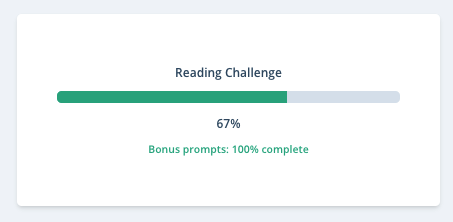
Read, Seed, Water, Feed 2025 / Welcome to the Read, Seed, Water, Feed - 2025 Challenge! This challenge is designed to be intentionally reflective, however that shows up for you. The prompts were developed partly from my own reading and experiences, on topics very close to my heart, with a focus on authors who are Black, Indigenous, and/or part of the global majority. (caption & alt text for the image)
In Storygraph, the books added as suggestions for each topic/prompt are selected from my reading, with some from my TBR where I am still early in my reading on a topic. I plan to post and share about many of these here.
reading challenge topics: intro
Below are the prompts for each of the topics in the reading challenge.
Book written by an author from/written about Puerto Rico
The book can be fiction or nonfiction. Authors in the diaspora are included. For books written about Puerto Rico, authors not of Puerto Rican origin are allowed.
Book of poetry or short stories by a Black and/or Indigenous author
Historical fiction by an author who is Black, Indigenous and/or part of the global majority
Book written about or by one or more current or former prisoners
The book can be fiction or nonfiction.
A fictional book can be about the experiences of prisoners and the carceral system within an anti-carceral narrative and may reference current or former prisoners rather than be generally about a specific prisoner(s).
Book written about/by an author from the Congo, Lebanon, Palestine, Sudan, Syria, or Yemen
The book can be fiction or nonfiction. Authors in the diaspora are included. For books written about a country, where possible, select books written by authors of the country and try to amplify the need for more support & funding for their perspectives to be shared. Authors not of a country are also valid entries.
Countries: Congo, Lebanon, Palestine, Sudan, Syria, or Yemen.
Book about impacts of US actions taken in the name of the “war on terror” & the cost of US “freedom”
The book can be fiction or nonfiction. The category assumes an expansive view of impacts, including those to humans, environment, and more, within the US and globally. The book could also be about the actions of US allies taken in the name of the "war on terror" and their impacts.
While defunding social services and anything not around policing, military, prisons, or surveillance, is connected, please consider a book that focuses on, is about, and/or is written by the communities who are most impacted specifically through the "war on terror" and its accompanying racism, Islamophobia, xenophobia, dehumanization, etc.
Book by a Caribbean author
The book can be fiction or nonfiction. Authors in the diaspora are included.
Countries and Territories of the Caribbean region include the islands of Anguilla, Antigua and Barbuda, Aruba, The Bahamas, Barbados, British Virgin Islands, Caribbean Netherlands, Cayman Islands, Cuba, Curaçao, Dominica, Dominican Republic, Grenada, Guadeloupe, Haiti, Jamaica, Martinique, Montserrat, Puerto Rico, Saint Barthelemy, Saint Kitts & Nevis, Saint Lucia, Saint Martin, Saint Vincent, Sint Maarten, Trinidad & Tobago, Turks & Caicos Islands, US Virgin Islands, and the mainland countries (included here and in the prompt for Central & South America) of Belize, Guyana, Suriname.
Graphic novel or comic book by a Black and/or Indigenous author
Book about antiblackness and/or what it is to be Black in this world by a Black author
The book can be fiction or nonfiction.
Examples of books for this category include: a book by a Black author that centers antiblackness, whether as the main topic or as one of the themes, a book on afropessimism, and/or a book by a Black author as a Black person but its goal is not to satisfy or educate the white gaze.
The language in this prompt and description was developed collaboratively with my partner who has lived experiences and understandings. We attempted to describe something that felt like it should be a conversation.
Book written by/about that includes the perspective of a sex worker
The book can be fiction or nonfiction.
Book of poetry, essays, or a memoir by a queer or trans author who is Black, Indigenous and/or part of the global majority
The book can be a single author or an anthology.
Book that is on or includes anarchism by an author who is Black, Indigenous, and/or part of the global majority
The book can be fiction or nonfiction.
Nonfiction book on abolition, immigration justice, and/or what we build in their place
This broad category includes
- abolition of all types of punitive and racially biased systems of injustice and other oppressive systems that cause harm (police violence, incarceration, surveillance, borders, nation states, child protective services, traditional family structures, capitalism, etc) to mostly already marginalized communities
- building communities that embody collective care, support and defense, community-centered and accountable systems of relating to each other, and more
- learning and applying ways to tear down the systems and structures that hurt people and imagining and creating ones that are based on supporting and caring for each other
Find more under Expanded Explanations later in this post.
Book written by an author from/written about Haiti
Authors in the diaspora are included. For books written about Haiti, authors not of Haitian origin are allowed. The book can be fiction or nonfiction.
Book about any/some/all: disability, mental health, neurodivergence, healing
The book can be fiction or nonfiction.
Deepening and expanding our understanding of how to think about these topics and learning from experiences that may be different from our own can increase/strengthen how our imagination responds to empathy, increasing the possibility of finding ways to take action related to collective care at both a local and a planetary level. And imagine if what we read leads to our own unexpected healing—it might make it more possible to support others or even for ourselves to survive.
Book written by/about that includes perspectives of peoples experiencing homelessness
The book can be fiction or nonfiction. This category is broad and global, and includes considerations shared in the next prompt.
Book written by/about that includes perspectives of refugees and other migrants
The book can be fiction or nonfiction. This broad category includes internal and cross-border displacements of all types.
This category offers a way to select a book that deepens our empathy and understanding of the experiences of people who have fled violence, persecution, risk of harm from the family, targeting by the state, etc, who have migrated, and/or been forcibly displaced, and expands our awareness of the differences and similarities in the ways refugees and other migrants and forcibly displaced people, including many people who are homeless, are treated in different communities, by international and local organizations, vigilantes, government policies, etc, across the globe.
Find more under Expanded Explanations later in this post.
Indigenous speculative fiction book (ex. Indigenous futurism, fantasy, spec. fiction, etc)
Decolonial, anti-imperialist, and/or anti-carceral feminism by an author who is Black, Indigenous and/or part of the global majority.
The book can be fiction or nonfiction.
Black speculative fiction book (ex. Afrofuturism, Africanfuturism, Black horror, fantasy, etc)
The book can be fiction or nonfiction.
This category assumes an expansive definition and vision of Black Speculative Fiction.
Find more under Expanded Explanations later in this post.
Novel by a nonbinary, two-spirit, trans, and/or intersex author or has a main character who is
Book about slavery or the afterlife of slavery by an author who is Black, Indigenous and/or part of the global majority
The book can be fiction or nonfiction.
More background is in Saidiya Hartman’s preface to the 25th anniversary edition of Scenes of Subjection, a version of which was published on NY Books in 2022, called “The Hold of Slavery”.
This category includes all places and structures in which the hold of slavery continues to have a grip, including the continued destabilization of the African continent, and the expansion of cop cities, militarized policing, prisons, detention facilities, and more.
Find more under Expanded Explanations later in this post.
Book by a Mexican or Central or South American author
Authors in the diaspora are included. The book can be fiction or nonfiction.
Countries: Mexico / Countries of Central America: Belize, Costa Rica, El Salvador, Guatemala, Honduras, Nicaragua, and Panama / Countries and territories of South America: Argentina, Bolivia, Brazil, Chile, Colombia, Ecuador, Guyana, Paraguay, Peru, Suriname, Uruguay, Venezuela, and the internal territory French Guiana.
(The countries of Belize, Guyana, and Suriname are also considered part of the Caribbean region and are included in that prompt as well).
Book: impacts of people w/power interacting w/water in a way that obstructs the flow of life
This category offers a way to select a book that enables reflection on how people with power interact with water—water itself, its flow, or using it as a means of travel—in ways that disproportionately obstruct the flow of life and harm communities that are Black, Indigenous, and/or part of the global majority, in the past, present, and/or future. The book can be fiction or nonfiction.
If you aren’t sure what fits or why, try this:
- Find a book you want to read that may or may not fit in any other category, but is connected to the overall theme of this challenge, then think about how it might be related to this topic. That reflection is the connection to this topic. Would it help to write about it or discuss with another person? Or both?
- It could be about anything that is connected to the long-lasting impacts of past and present actions of “people w/power interacting w/water in a way that obstructs the flow of life” that creates the destabilization of a place, people, animals, land, water, ice, etc.
Note: I wrote many reflections related to this topic, but it is now the last to be republished, though it was in the first, but unpublished. It will find a way to this site, it is deeply connected to this reading challenge and my own personal myriad of backgrounds.
bingo cards!
Find Bingo cards at this link. Downloadable for screen display or printing, each prompt on the printing version has a small box for writing in.
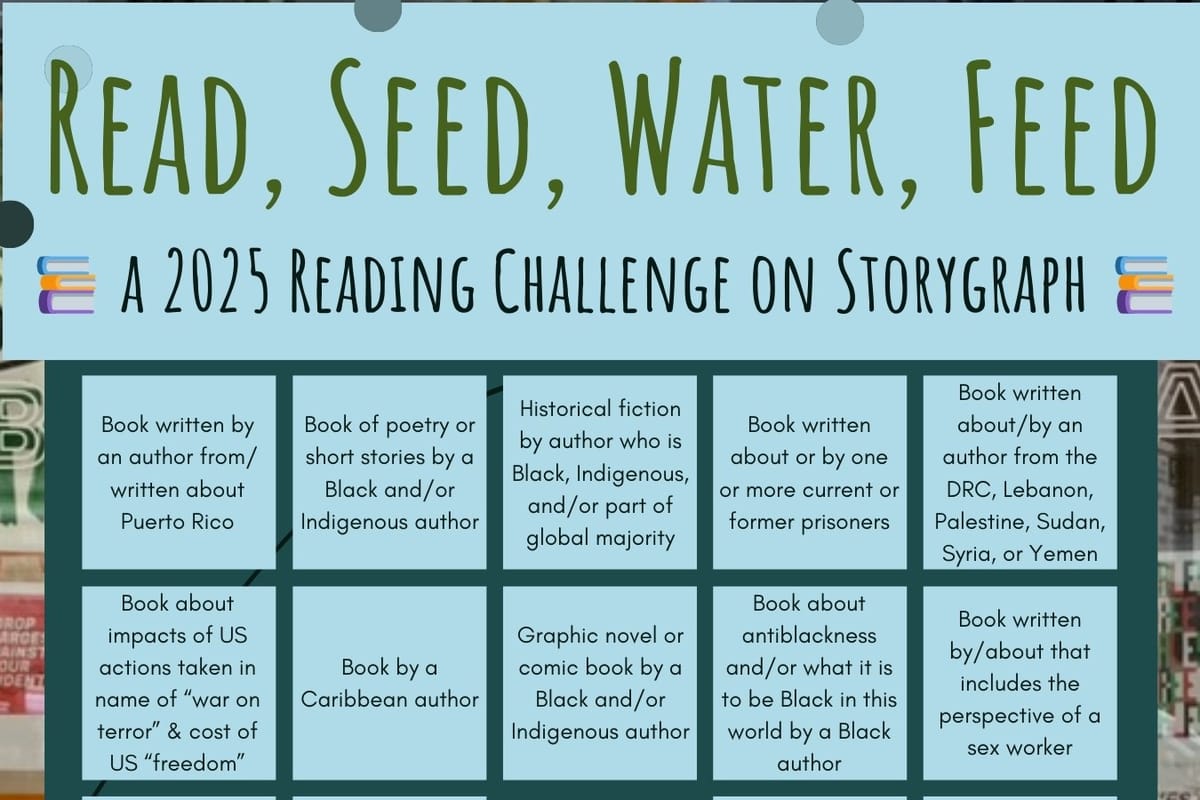
Bingo cards for the Read, Seed, Water, Feed 2025 reading challenge hosted on Storygraph. Downloadable for screen display or printing, each prompt on the printing version has a small box for writing in.
expanded explanations for some topics
Partly because this reading challenge is intended to be reflection-based, I want to expand on several of the topics for clarification and/or to introduce ideas.
Book written by/about that includes perspectives of refugees and other migrants
The book can be fiction or nonfiction. This broad category includes internal and cross-border displacements of all types.
This category offers a way to select a book that deepens our empathy and understanding of the experiences of people who have fled violence, persecution, risk of harm from the family, targeting by the state, etc, who have migrated, and/or been forcibly displaced, and expands our awareness of the differences and similarities in the ways refugees and other migrants and forcibly displaced people, including many people who are homeless, are treated in different communities, by international and local organizations, vigilantes, government policies, etc, across the globe.
Find more under Expanded Explanations (this section).
Warsan Shire’s poem “Home,” published in Bless the Daughter Raised by a Voice in Her Head, expresses ideas that are deeply related to why I set up this reading challenge in the way that I did. Sharing an excerpt to me feels incomplete, almost like theft, and I share it for its foundational presence, encourage the reading of the entire book, and then again. To me, the poem may enter the brain, but never leaves the heart. In one version of her poem "Home," British-Somali poet Warsan Shire writes,
No one leaves home unless home is the mouth of a shark. You only run for the border when you see the whole city running as well. The boy you went to school with, who kissed you dizzy behind the old tin factory, is holding a gun bigger than his body. You only leave home when home won’t let you stay.
[...]
No one puts their children in a boat, unless the water is safer than the land. No one would choose days and nights in the stomach of a truck, unless the miles traveled meant something more than journey.
With deepest appreciation, and we all need to read more of Warsan Shire.
Black speculative fiction book (ex. Afrofuturism, Africanfuturism, Black horror, fantasy, etc)
The book can be fiction or nonfiction.
This category assumes an expansive definition and vision of Black Speculative Fiction.
Find more under Expanded Explanations (this section).
This category assumes an expansive definition and vision of Black Speculative Fiction, such as the one shared by Ugandan American poet and writer Hope Wabuke in her 2020 essay, “Afrofuturism, Africanfuturism, and the Language of Black Speculative Literature” in LA Review of Books,
Black Speculative Literature is science fiction, fantasy, horror, and alternate realities centering Black African and diasporic cultures, mythologies, and philosophies. It must not center the white Western gaze. […] No matter what we call it, however, it is understood that the impetus of Afrofuturism, Africanfuturism, and Black Speculative Literature is to center African and African diasporic culture, thought, mythos, philosophy, and worldviews. Black Speculative Literature looks not to the past and its violent oppression of Blackness, but rather to the future, to imagine alternate possibilities of Blackness that can be lived in safety, creativity, and freedom.
Book about slavery or the afterlife of slavery by an author who is Black, Indigenous and/or part of the global majority
The book can be fiction or nonfiction.
More background is in Saidiya Hartman’s preface to the 25th anniversary edition of Scenes of Subjection, a version of which was published on NY Books in 2022, called “The Hold of Slavery”.
This category includes all places and structures in which the hold of slavery continues to have a grip, including the continued destabilization of the African continent, and the expansion of cop cities, militarized policing, prisons, detention facilities, and more.
Find more under Expanded Explanations - (this section).
If you’re unfamiliar with what is meant by the afterlife of slavery, in Lose Your Mother (2007), Saidiya Hartman defined the afterlife of slavery:
If slavery persists as an issue in the political life of black America, it is not because of an antiquarian obsession with bygone days or the burden of a too-long memory, but because black lives are still imperiled and devalued by a racial calculus and a political arithmetic that were entrenched centuries ago. This is the afterlife of slavery—skewed life chances, limited access to health and education, premature death, incarceration, and impoverishment. I, too, am the afterlife of slavery.
Nonfiction book on abolition, immigration justice, and/or what we build in their place
This broad category includes
- abolition of all types of punitive and racially biased systems of injustice and other oppressive systems that cause harm (police violence, incarceration, surveillance, borders, nation states, child protective services, traditional family structures, capitalism, etc) to mostly already marginalized communities
- building communities that embody collective care, support and defense, community-centered and accountable systems of relating to each other, and more
- learning and applying ways to tear down the systems and structures that hurt people and imagining and creating ones that are based on supporting and caring for each other
Find more under Expanded Explanations - (this section).
On why immigration justice is identified individually, it is increasingly criminalized, where the enforcement of borders is already violent. [1] Silky Shah shares in Unbuild Walls (2024),
The “nation of immigrants” incarcerates more immigrants than anywhere else in the world.”
[...] the moral panic around the border, cynically used to garner votes, simultaneously obscures the actual causes of unprecedented levels of migration, namely the destabilization of the Global South and the climate catastrophe.
In Border and Rule (2021), Harsha Walia, writes,
A no borders politics is more expansive than an open borders one; it calls on us to transform the underlying social, political, and economic conditions giving rise to what we know as “the migration crisis.
I will be writing and sharing much more within these pages.
books
At the end of each post, I will share books I referenced and recommend unless the post itself already contains recommendations with book covers or the book is not part of recommendations, but was related to a quote or passage I shared. Some books, I will touch on again, but in case that doesn't happen, I will try to include each.
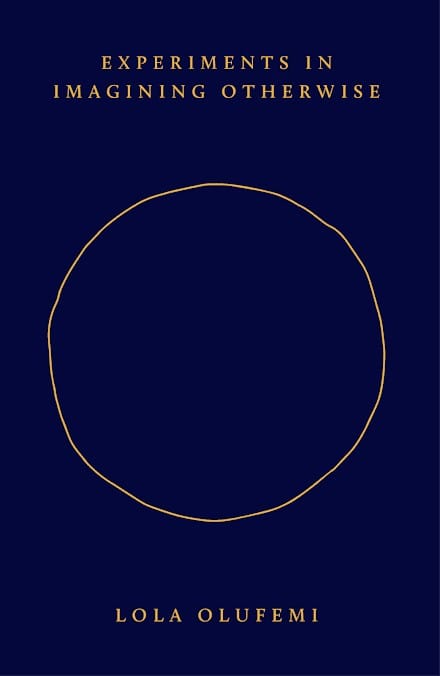
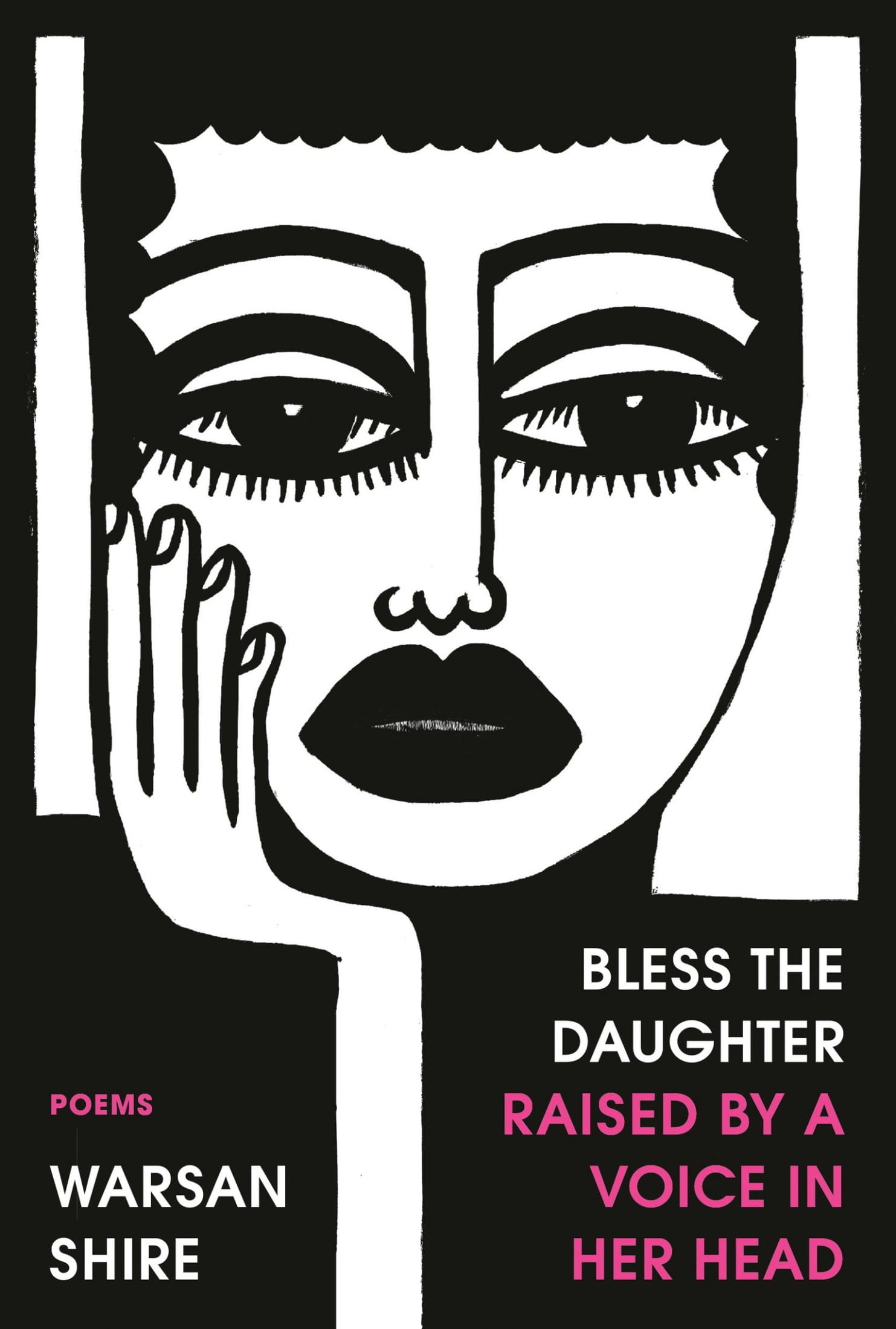
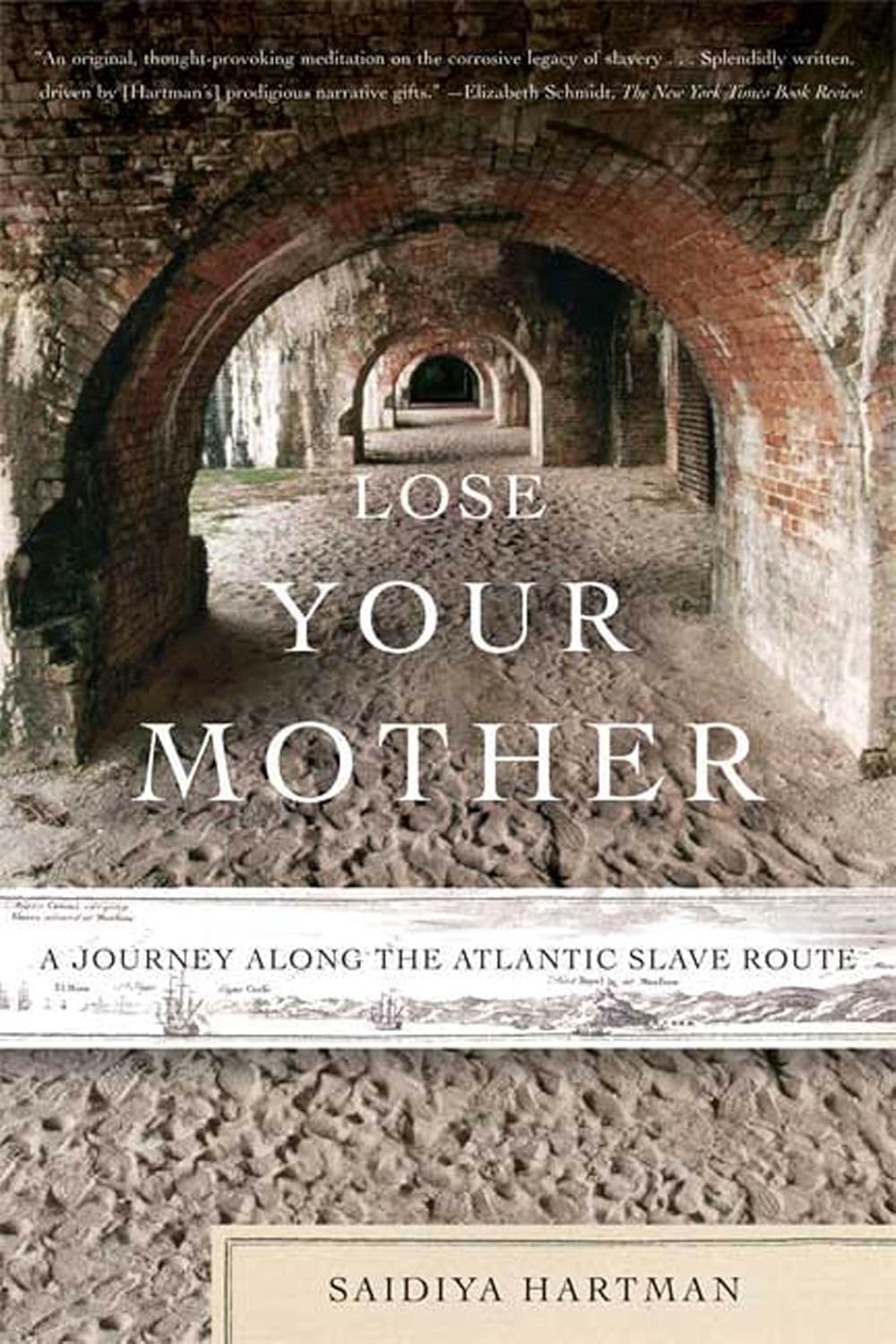
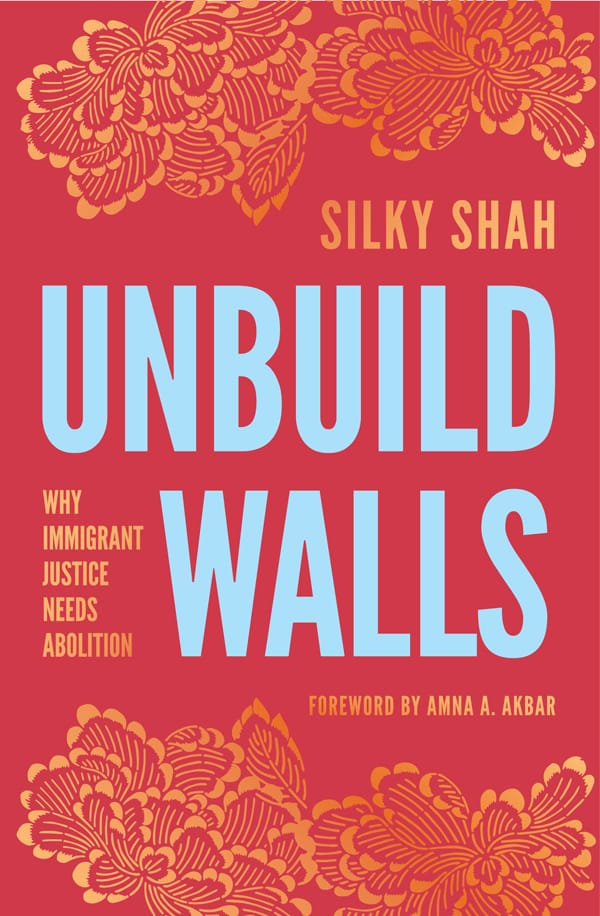
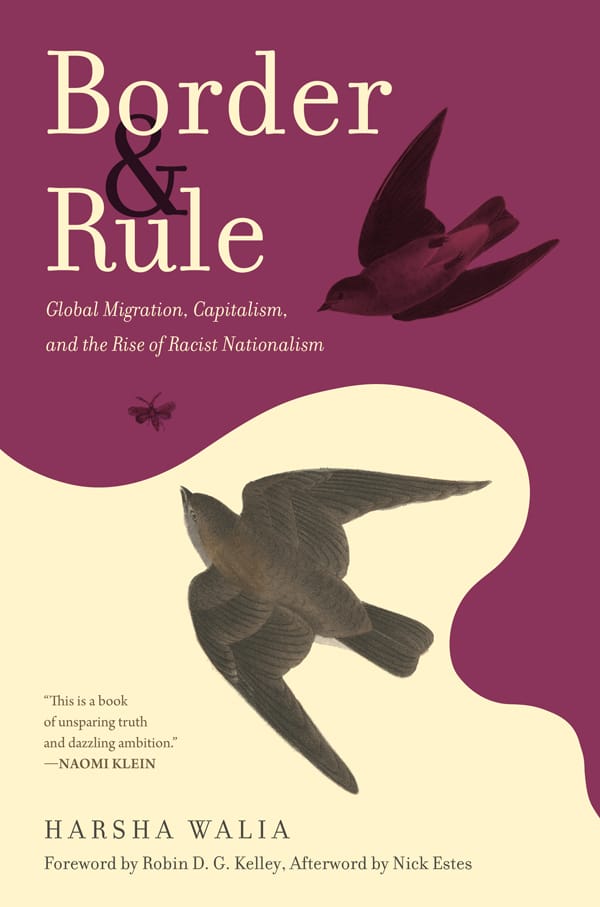
Upper row: Experiments in Imagining Otherwise (2021), a book by Lola Olufemi, published by Hajar Press. Bless the Daughter Raised by a Voice in Her Head (2022), a book by Warsan Shire, published by Penguin Random House. Lose Your Mother: A Journey Along the Atlantic Slave Route (2008), a book by Saidiya Hartman, published by Farrar, Straus and Giroux, an imprint of Macmillan Publishers. Lower row: Unbuild Walls: Why Immigrant Justice Needs Abolition (2024), a book by Silky Shah, published by Haymarket Books. Border and Rule (2021), a book by Harsha Walia, published by Haymarket Books.
Get any/all of these books wherever you get your books. Please support libraries however you can. Find out many ways to get involved in supporting libraries at Libraries for the People.
Thank you for reading.
notes
This note relates to explaining why immigration justice is identified separately from abolition. As I copy & paste most of this text now, after writing up what I needed to do to move the content to a different platform and start again, a few weeks after initially writing it, the expansion for this category is probably no longer needed, as the reason or need for immigration collective defense and refusal to detain and abolition of all detention facilities, majority of which are privately run, has become clear to more people, and more people have been detained, kidnapped, deported, etc. But still until we can change the system, we must continue to do what we can.↩︎
